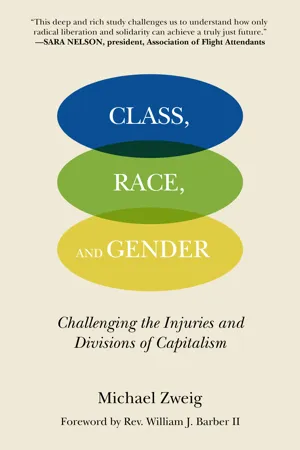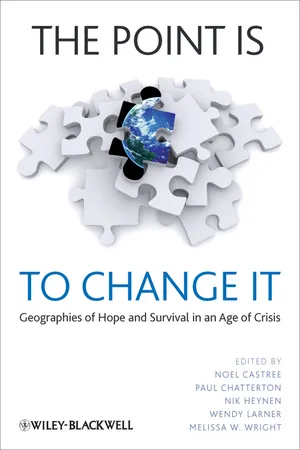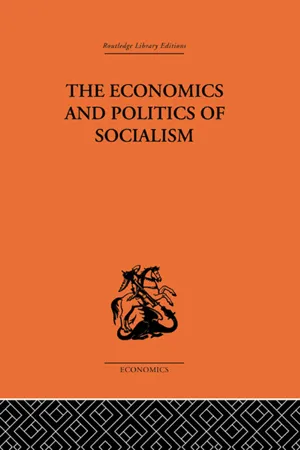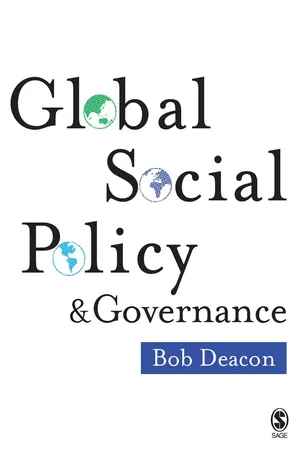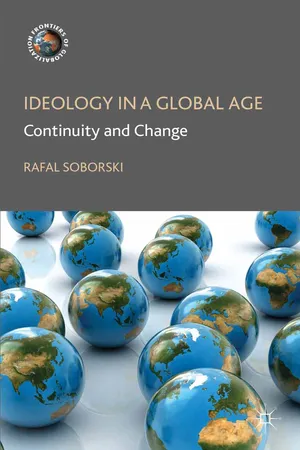Politics & International Relations
Socialism
Socialism is an economic and political system that advocates for collective or government ownership and control of the means of production and distribution of goods and services. It aims to reduce economic inequality and promote social welfare through policies such as progressive taxation, public ownership of key industries, and social welfare programs. Socialism is often associated with the pursuit of greater economic and social equality.
Written by Perlego with AI-assistance
Related key terms
6 Key excerpts on "Socialism"
- eBook - ePub
Class, Race, and Gender
Challenging the Injuries and Divisions of Capitalism
- Michael Zweig(Author)
- 2023(Publication Date)
- PM Press(Publisher)
CHAPTER ELEVEN Socialism Socialism finds resonance among people facing lives of unstable employment at low wages, crushing student debt, racial and ethnic marginalization, endless war, and environmental catastrophe. We have seen that each of these conditions is a direct consequence of the natural function of capitalist economies when unrestrained. Challenging a system that results in these conditions is a no-brainer for growing numbers of people. It’s important for progressive activists and organizers to understand Socialism in a nuanced way so we can engage with the American people effectively when the question comes up in our work. Since the 2016 presidential campaign of Bernie Sanders, interest in Socialism has grown dramatically in the US, spurred on as a counterpoint to the election of Donald Trump and his racist and hostile policies directed toward working people. The election of Alexandria Ocasio-Cortez, Jamaal Bowman, Cori Bush, and other democratic-socialist congressional candidates in 2018 and 2020 put Socialism squarely in the center of practical politics. But what is “Socialism”? Different Meanings of Socialism Given its long and varied tradition, the word “Socialism” has many meanings. It can refer to a system of thought that looks at capitalist society from the point of view of the working class and proposes political paths by which the working class can replace the capitalist class as the dominant power in society. This is its meaning in Friedrich Engels’s booklet Socialism: Utopian and Scientific, 1 in which he contrasts his and Karl Marx’s analysis of capitalism with other socialist critics of the time. Socialism can also mean a social system in which the working class is the ruling class, having replaced the capitalist class and gained the power to reorganize society in its own interests. This need not mean that there are no entrepreneurs. It certainly doesn’t mean that there will be no managers - eBook - ePub
- Vic George, Nicholas Manning(Authors)
- 2021(Publication Date)
- Routledge(Publisher)
Like Ferge, Roos sees social policy under capitalism as being essentially subordinate and supportive of the system, while under Socialism it is a medium for change towards the communist society. His definition of socialist social policy is as follows:social policy is the totality of those collective activities through which social relations, processes and structures are managed and developed in that field of social life which is related to the needs of the population and their way of life and which is directed towards eliminating of social inequalities and creation of classless society.16Social policy is thus seen in very broad terms — to help satisfy the needs of the population, to eliminate social inequalities and to help create a classless society. Socialist social policies, like welfarist social policies, will vary from one socialist country to another according to the country’s economic development and its cultural traditions. In the same way that welfare states under advanced capitalism differ in a variety of ways, though their fundamental relationship to the economic system is the same, so will socialist social policies differ even though their main aim is to assist in the country’s transformation to a classless communist society.Political economy and social policy
What needs to be ascertained is the extent to which this ideal type of socialist social policy has become or is likely to become a reality in the Soviet Union. We will examine the main features claimed for socialist social policy under three headings: structural, ideological and redistributional. First, by the very nature of the economic system, universal and comprehensive social policies are structurally more possible in socialist than in capitalist societies. It is not simply that the ideology of a socialist society supports such policies but also because a centrally-planned economic system can function better alongside centrally-planned universal social services.Social policy is in its intentions more comprehensive and universal in the Soviet Union than in any welfare capitalist society. It is not only more broadly defined but also more government-provided than in any capitalist country. It covers not only education, health and social security but housing and subsidies for holidays, transport and food. The responsibility for providing these services rests primarily with the government and it is not shared with private enterprise as is the case in capitalist societies. There is no private education or private health services or privately rented housing of any substance or occupational pensions, and so on. Social policy is a government responsibility to a far greater extent than in capitalist society. This is not a point of mere theoretical interest but potentially of substantial practical importance. The existence of private social services for the use of the wealthy groups in welfare capitalist societies means that the pressure on governments to improve social services is reduced. It can result in a division of social services where the private sector is superior to the government sector in terms of both quality and availability of services. - eBook - ePub
The Point Is To Change It
Geographies of Hope and Survival in an Age of Crisis
- Noel Castree, Paul A. Chatterton, Nik Heynen, Wendy Larner, Melissa W. Wright(Authors)
- 2013(Publication Date)
- Wiley-Blackwell(Publisher)
Whatever we may find to celebrate in 1968 as a year of awakening and rebellion, the collective memory that has evolved since then has entailed also a forgetting—namely, forgetting the idea of Socialism, and more specifically Socialism in relation to the self-activity of the working class, and as the classless society envisaged by Orwell. I will explain this by examining the development of socialist politics in the twentieth century, and the reasons for the evident failure of socialists to achieve their goals up to the present. I will go on to argue in particular that we need to break once and for all with the failed trajectories of “revolutionary” Socialism, which sought to achieve its goals through the destruction of the existing social, economic and political order.To begin with, however, it may be helpful to say what I mean by the term Socialism. It has been understood in many different ways since its first use in the 1830s, varying according to the political agenda of both supporters and opponents. One common understanding equates Socialism with collective state ownership of the means of production and central planning; this is based primarily on the economic model that governed the Soviet Union from 1928 to 1991, but can also refer to the extensive public ownership found in many otherwise capitalist economies for 40 to 50 years after World War II. There have been prolonged arguments about whether this “economic Socialism” can possibly be as productively efficient as a capitalist system based on private property and market relations. Advocates of this sort of Socialism may either reject the methodological individualism of capitalism’s supporters, or alternatively believe that it is possible to design a “market Socialism” in which collective ownership can be efficiently combined with freedom of choice at least in markets for consumer goods and services.1 The Marxist–Leninist tradition offers a variant on this theme, arguing that Socialism in this sense is a transitional form, to be superseded by a “higher stage” (usually termed communism) in which human nature has changed sufficiently from the capitalist norm for society to achieve Marx’s famous condition of “from each according to his ability, to each according to his need”.There is, however, a very different tradition, as old as that of state Socialism, which emphasises social relations of power at least as much as the economic system. This tradition has always questioned whether the replacement of private ownership by state ownership necessarily changes the lot of ordinary members of society, if they continue to have no voice in the disposition of society’s resources. The anarchist answer is to envision a society without a central state authority, but more commonly, socialists who reject the statist model argue instead for the creation of forms of organisation that vest effective power in society at large, in other words forms of egalitarian democracy. Because of the central importance of production in meeting society’s material needs, many socialists have argued for structures of economic management based on workers’ control over production: this tradition includes syndicalism, in which trade unions are the key organisations; guild Socialism, in which economic management is organised by branch of production; and council communism, in which central planning is combined with democratic control within each workplace.2 - eBook - ePub
- Wlodzimierz Brus(Author)
- 2013(Publication Date)
- Routledge(Publisher)
5 ). Each of these two elements, the ownership of the means of production and the state (political power), is the object of thorough separate analysis and its significance under Socialism carefully considered. However, the nature of their mutual relationship—on the one hand as ‘base’ and hence the determining factor, and on the other hand as ‘superstructure’ and hence as the determined factor—is generally accepted and regarded as holding good also under Socialism. It seems to me that this conviction, if I understand it correctly, is ill founded. In my opinion, the traditionally accepted relationship between economy and policy as ‘base’ on the one hand, and ‘superstructure’ on the other and hence as, ‘in the last resort’, the determining factor and the determined factor, needs, with respect to Socialism, fundamental modification. Economy and politics are so intimately intertwined, especially when considered dynamically, that the continued use of the old conceptual apparatus of ‘base’ and ‘superstructure’ becomes more and more inadequate. The dependence of the further development of socialist relations of production, and hence of the evolution of the ‘economic base’, on a corresponding development in political relationships—on changes in the political power system—makes itself especially felt in periods of crisis.This alteration in the relationship between economy and politics is evident in the very definition of a socialist economic system. The basic characteristic of such a system is generally reckoned to be the predominance of the social ownership of the means of production. (We shall not deal here with the difference between state and co-operative ownership but assume that we are concerned with social ownership appearing nowadays in the form of state ownership.)What, however, is social ownership? It is surprisingly difficult to find a full and precise definition of this term in the handbooks of historical materialism and the political economy of Socialism.Joseph Schumpeter6 along with many other non-Marxist authors uses the term public ownership , a concept at least partly derived from the formal and legal difference between the property of public bodies (the state, local government, etc.) and the property of private individuals or private organizations. It should be noted that even when so defined, in a socio-economic system where public ownership dominates, the relationship between politics and the economy is already quite different from that which obtains in classical capitalism, since now the political factor directly influences economic decisions about the growth and distribution of the national income.Marxist literature, however, has never been satisfied with the definition of social ownership as public ownership. Public ownership (especially state ownership) is not considered to be social ownership if it occurs in a capitalist state. The socialist character of the state is a necessary condition for the recognition of public ownership as social ownership. Hence, in this case, the character of the state—a political institution, an element in the superstructure—is considered to be a factor determining a basic relation of production—the nature of the ownership of the means of production.7 - eBook - ePub
- Bob Deacon(Author)
- 2007(Publication Date)
- SAGE Publications Ltd(Publisher)
The articulation and legislation of rights leads to some more or less effective mechanisms to ensure that citizens might access their rights. Social policy within one country is made up, then, of social redistribution, social regulation and the promulgation of social rights. Social policy within the world’s most advanced regional co-operation (the EU) also consists of supranational mechanisms of redistribution across borders, regulation across borders and a statement of rights that operates across borders. Social policy as social issues Yet another approach to defining the subject area of social policy is to list the kinds of issues social policy analysts address when examining a country’s welfare arrangements. In other words, social policy as a subject area is what social policy scholars do. A standard social policy text (Alcock et al., 2003) lists among the concepts of concern to social policy analysts: ‘social needs and social problems’, ‘equality rights and social justice’, ‘efficiency, equity and choice’, ‘altruism, reciprocity and obligation’ and ‘division, difference and exclusion’. These are elaborated below. Social justice : What is meant by this concept, and how have or might governments and other actors secure it for their populations? Possible trade-offs between economic efficiency and equity appear here. Mechanisms of rationing or targeting are included. Social citizenship : Whereas other social sciences are concerned with civil and political aspects of citizenship, social policy analysts focus upon the social rights of citizens - eBook - ePub
Ideology in a Global Age
Continuity and Change
- R. Soborski(Author)
- 2013(Publication Date)
- Palgrave Macmillan(Publisher)
8 Likewise, while the ideological shift to the right is unquestionably a key factor affecting political discourse in recent decades, it, too, can be understood as a time-specific trend reflecting the post-Keynesian and, in particular, post-communist hegemony of neoliberalism. That domination is now gradually being eroded by the economic shocks of recent years and, although the evidence for this so far is mixed, it can be tentatively assumed that the ongoing economic crisis will tend to push the political spectrum back towards the left. Consequently, socialists of various shades will, perhaps, regain confidence to phrase their political programmes in terms that conform closer to Socialism’s original commitments. In the meantime, it is important to note that ideological adjustments appearing in the socialist discourse, such as the social democratic accommodation to neoliberalism, are typically defended by individual and collective political actors in terms of the necessity to fulfill their underlying ideological priorities in the optimal way in the existing circumstances. In other words, it is a question of doing what can be done that should be done and the justifications for doing it still manifest socialist motivations in however tamed and timid forms.State-centred concepts of history, equality and globalizationAs I have argued using the case of Marxism, it is useful to look at socialist analytical and normative approaches to globalization in connection with meanings attached to the core socialist concepts of equality and history. Equality and history permeate the entire socialist territory but, as I have noted, these are very capacious concepts and they may be defined in a bewildering variety of ways even within one ideological family. Considered in a very broad brush fashion, socialist ideas of equality may be centred on the elimination of poverty, or the reduction of inequality, rather than on economic equality (equality of outcome) as demanded by Marxism. In the same way, socialist understandings of history as unfolding in a propitious direction may differ from the Marxist concept in that they may conceive progress in evolutionary and gradualist terms. Whatever their particular emphases, the socialist conceptualizations of equality and history are constructed interdependently. For any socialist current this is likely to mean that the more its reading of history diverges from the Marxist paradigm, the farther from Marxism will also be its understanding of equality. Ditto the idea of globalization; a socialist interpretation of globalization will be prone to adopt a non-Marxist flavour when influenced by a historiography that envisages a non-Marxist (gradual and peaceful) course of progress or by an idea of equality stopping short of the radical Marxist goal.
Index pages curate the most relevant extracts from our library of academic textbooks. They’ve been created using an in-house natural language model (NLM), each adding context and meaning to key research topics.
